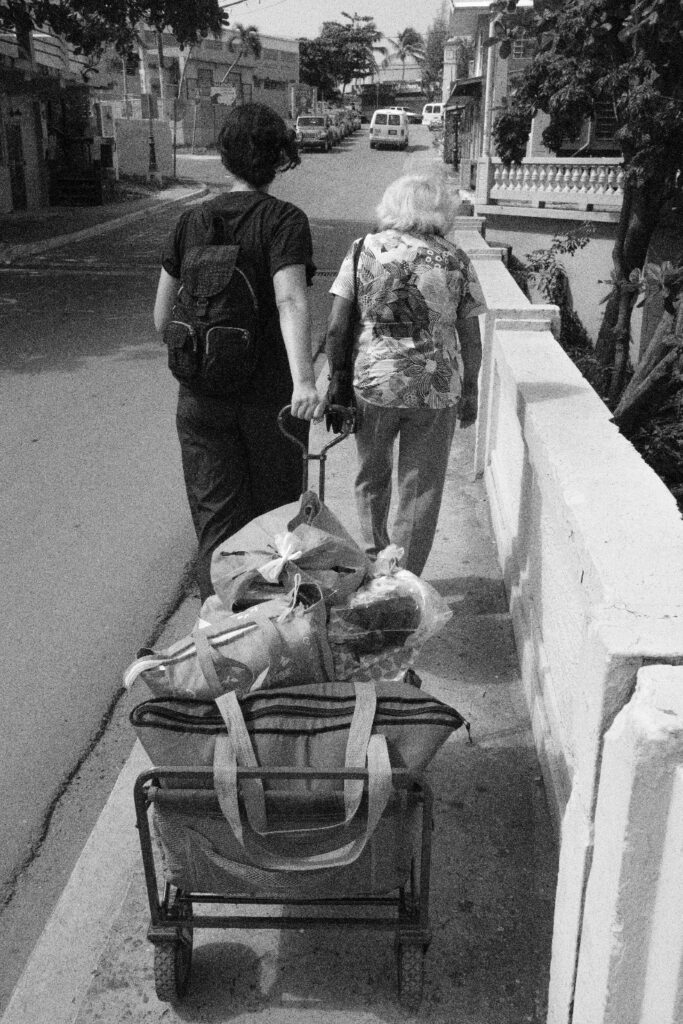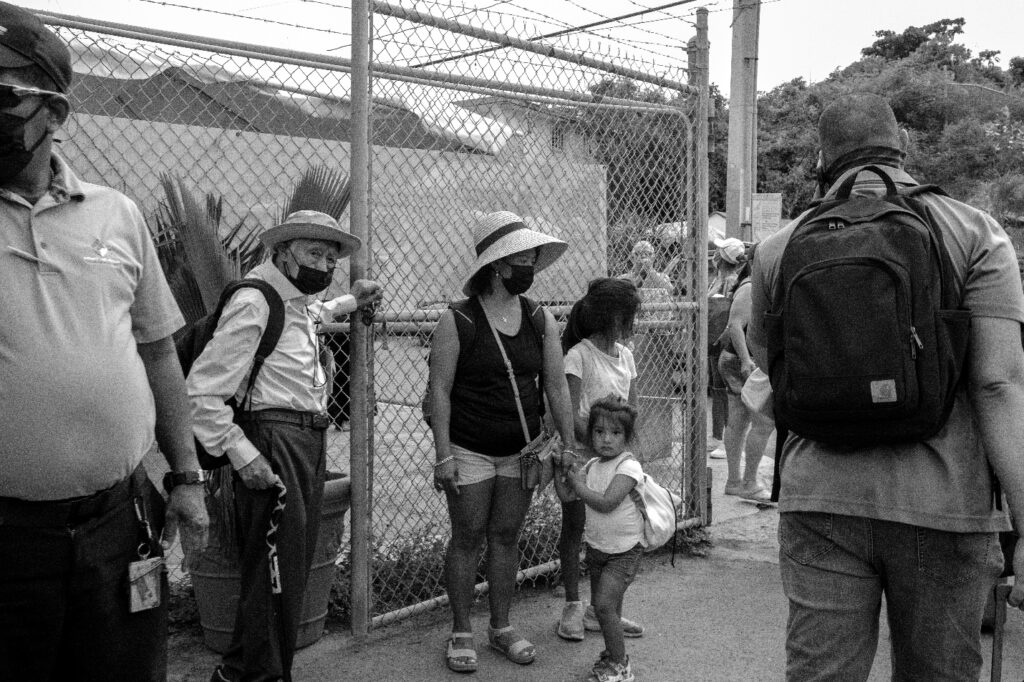Andrea Pimentel Rivera 2022 Field Report
Transportation justice research has exponentially grown in recent years and while ensuring equitable means of transport is a shared goal across some cities in the United States, this wave has not influenced Puerto Rico. The island’s current context of balancing the paradox of debt restructuring alongside a series of recent neoliberal policies dims the rethinking of our current transportation system in line with broader goals of justice. Taking a focus on a ferry-dependent setting whose maritime transportation service was recently privatized, this research sought to complicate our understanding of transportation governance by concentrating on the interrelated influences of debt, disasters, and militarized colonialism in policymaking.
This research followed a case study design where the island of Vieques, Puerto Rico was selected to gain an understanding of how expressions of coloniality produce (im)mobilities, given the island’s militarized colonial past. Using a mobility justice framework, this research emphasizes the politics and power dynamics within everyday mobility infrastructures. Locating the ongoing struggles against the privatization of the passenger ferry service within Vieques’ historical context of direct colonial exploitation by framing the deficient ferry service as a mobility injustice allows us to examine how the crises of neoliberal coloniality intersect and specifically land in transportation infrastructures.
For this project, I used two main methods of inquiry: first, an analysis of public policies from the past ten years concerning the municipal island maritime transportation service. The outcome of this effort was a manuscript submitted for a special issue for The Geographical Journal. Then, this initial analysis was complemented with ethnographic work conducted over the summer of 2022 consisting of participant observations, and semi-structured interviews with key informants within the Vieques community.
Overview of fieldwork data collection
The CLAG Field Study Grant financially assisted me in conducting the fieldwork portion of my research project that examines the impacts of public policies on both resident participation in the decision-making processes, as well as their mobilities using the ferry service. Part of my ethnographic work entailed experiencing ferry travel within its current context of being run by a private operator. As such, between June 2022 and August 2022 I traveled at least once a week to Vieques. On these trips, I would either conduct a roundtrip and return on the same day, or I would stay over in Vieques; this was planned according to the interviews I was able to schedule with key informants.
While traveling on the ferry, I used a participant observation sheet which included options to record details about the weather that day, which ferry I took, its scheduled departure time versus the actual departure time, and general observations about passengers and employees. In general, I chose to not approach residents while traveling via ferry because the context in which their trips are made did not warrant a researcher interrupting their day to ask questions about their experiences. In other words, I did not want to pose as a nuisance for people ending their day’s errands. Throughout the summer, I did a total of sixteen ferry trips as a passenger. I did not use the cargo ferries because non-residents of the municipal islands are currently not allowed to travel with their vehicles.
Overall, I found that the service at each terminal varied, with the travel experience being quite tortuous and regimented in the Ceiba Ferry Terminal, but less strict in the Vieques Ferry Terminal. Additionally, I observed how passengers felt constant pressure to arrive at the terminal on time as the private operator routinely closed boarding considerably early and departed some minutes before the scheduled departure time. The issue with departure times, as well as continued inconsistent ticket sales, and inadequate vessel capacity were issues that came up as grievances with current service from informants.
In Vieques, I did a total of nine in-depth interviews with key informants selected via the snowball sampling method. One interview was done via Zoom, with a total of ten interviews. I initially approached two participants through social media who had been publicly involved in processes related to the changes in ferry service. The interviews lasted between twenty minutes and two hours. Later, these participants were asked to recommend others who could participate in the interview. Three participants were associated with the local government, three were business owners, and there was an overlap between the former categories with seven participants identifying as community leaders (either in social movements or local non-profits).
Preliminary conclusions
The privatization of the ferry service does not address the profound mobility injustices across different scales. Consequently, passengers experience a loss of control and accountability over a public good and an essential service. Furthermore, the conditions in which privatization was conducted, in addition to existing forms of citizen participation, have resulted in a lack of transparency over how decisions are made. A consequence of this is that the conditions of the contract appear to only financially benefit the company running the ferry service, since municipal island residents have lost the limited decision-making power they had when the service was still run as a government corporation.
Nonetheless, the contract permits and persists a practice of short-term solutions to the overall service that do not solve people’s mobility needs. The terminal continues to be in poor conditions with informants sharing instances of situations in which uncomfortable or dangerous situations occurred to passengers, primarily older island residents. It is unclear whether or not the terminal follows ADA compliancy. Additionally, after four years of having moved the terminal to Roosevelt Roads, its improvements have been far and few in between, done only in a haphazard form of renting equipment (such as the tents and portable bathrooms used in the waiting area).
The act of viewing the privatization of the ferry service as an isolated transportation service ruptured the dwindling transportation network that connected island residents to the services around the East Region. In other words, there are no efforts to treat the ferry service as a part of a transportation network; instead, it is marketed and administered as a “tour” for tourists. This prioritizes the demands of a visitor economy above the mobility needs of municipal island residents. A consequence to residents is that they opt to not travel at all in fear of the unknown mobility conditions on the main island, pushing them to deliberately miss important medical appointments and further complicating their continued health treatments.
Thesis title: Opposing powers at the helm and the im/mobilities of the maritime transportation in Vieques, Puerto Rico
Abstract: Following recent calls for decolonial perspectives within transportation geography that argue towards three interrelated shifts in siting, epistemological, and empirical approaches, this thesis research seeks to expand existing scholarship that examines transportation policies beyond techno-social issues through framing the deficient passenger ferry service of Vieques, Puerto Rico as a mobility injustice. The thesis takes on a qualitative case study design in looking at the coloniality behind governance practices for the maritime transportation service in Vieques, Puerto Rico. The island of Vieques is one of two municipalities in Puerto Rico that is entirely reliant on a ferry service that was recently privatized under contested terms. I have used two main methods of inquiry: a materials analysis approach looking at the twenty years in with the Maritime Transportation Authority was the main institutional actor in charge of administering the ferry until the service became privatized with HMS Ferries. Such materials include laws, passed and unpassed legislation, transportation plans, and grant proposals. Secondly, ethnographic methods of participant observations and interviews were used to note recent changes with privatization and the experiences of ferry advocates in the decision-making processes of the service. Overall, I argue that the coloniality within the power and politics surrounding the governance of infrastructures of mobility, such as the ferry, affects lived experiences, which are in turn shaped by broader processes that produce immobilities in Puerto Rico. This also reifies existing environmental injustices from Vieques’ militarized colonial past, turning issues of lack of access to healthcare into mobility injustices.
Keywords: Critical transportation geography, mobility justice, Vieques, ferries
All photographs were taken by Gabriel Cruz – https://gabrielocruz.com/


Please see the full report for more details.


















